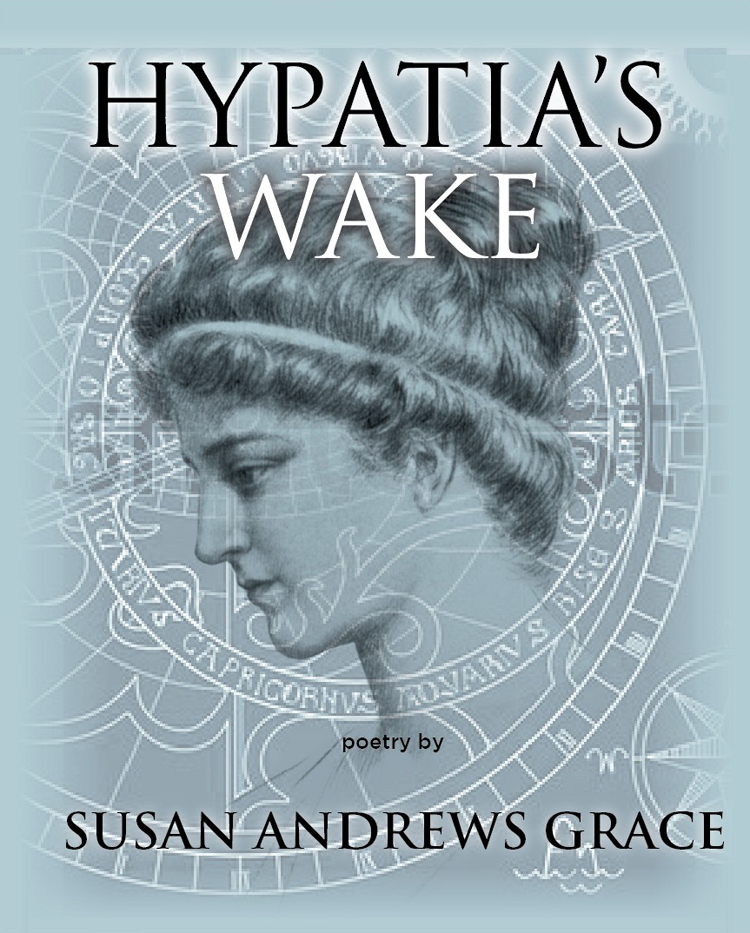If you don’t know the work of Susan Andrews Grace, writer, artist, teacher, it’s a good time to discover a poet and a visual artist who has accomplished a significant body of work. Hypatia’s Wake is Susan Andrews Grace’s sixth book of poetry. Author Sylvia Legris has described Grace’s poetry as “…fiercely intelligent with biting dashes of wit and intelligence…” I would tend to agree, especially when the poetry leads one to the visual arts and the visual arts sends us back to the poetry of this multidisciplinary artist. To enjoy each piece is to be made thirsty for the ways in which Grace works intermodal variations to shed light. To study her poetry is to remember the texture of her visual art: organza, hand-sewn elements, pearls, fine red ribbons, copper wire, marriage boxes, galvanized steel, red wires, series of handmade small square wooden frames filled with colour, of tiny details, like so many microscope slides on display for examination by your heart, your mind, and both your aesthetic and ethical conscience.
In the U.S, Hypatia’s Wake was a finalist for the Barrow Street Press Poetry Prize in 2017. Philosopher at the Skin Edge of Being (Signature Editions, 2013), her fifth book, was shortlisted for the 2014 Fred Cogswell Award for Excellence in Poetry. What I’m saying is that her work is good. Really good. And she lives right here in the unceded territory known as Nelson being consistently relevant, with a knack for deep inquiry, research, synthesis, deconstructing, defining, refined esthetic, and even, generosity towards other artists.
For her power as a teacher, mathematician, and inventor in Ancient Greece, Hypatia’s fate was sealed by the darkness of her times. A shadow that lives still in our time. Reading about her at least made me awake to a fellow poet sister and just how dangerous it was – and still is – to speak. A wake is still a propos since just as I discover her, I must also mourn her and all the women and sisters, here and abroad who know the reality of being deleted from history for being a woman and having a vision.
Hypatia’s Wake is a poetic re-imagining of a woman of substance (Hypatia of Alexandria BC) by a woman of substance (Susan Andrews Grace) in a spirit of both re-membering, contextualizing, and perhaps, calling out the patriarchy and the his-storians. It is also a ”galvanization of feminine worth”; a highlighting of how, for so long, Hypatia was like her mother – “not named”; how Hypatia – as many women – are “spoken of in their absence”. The implication of these statements all point to voice. Poetic voice, prosaic voice, political voice, relational voice. Andrews Grace and Hypatia share many points, the least of which is that they are both teachers. Teaching artists are dangerous, subversive even, because they have no intention to teach you what to think, only, more disruptively, how to question and inquire. Read it. Get it. You’ll be glad you did.
To learn more about Susan Andrews Grace, visit: https://www.susanandrewsgrace.com
About the Author
Carina Costom (she/her) is a bilingual (French and English) poet and essayist. Her creative non-fiction has been published in the Black Bear Review and the Nelson Star. www.carinacostom.com

